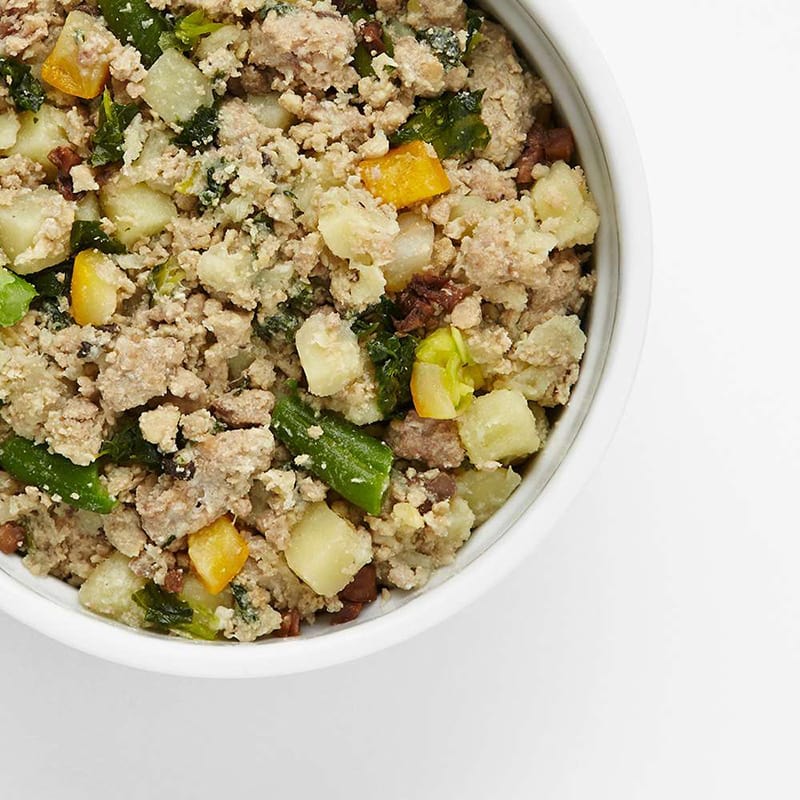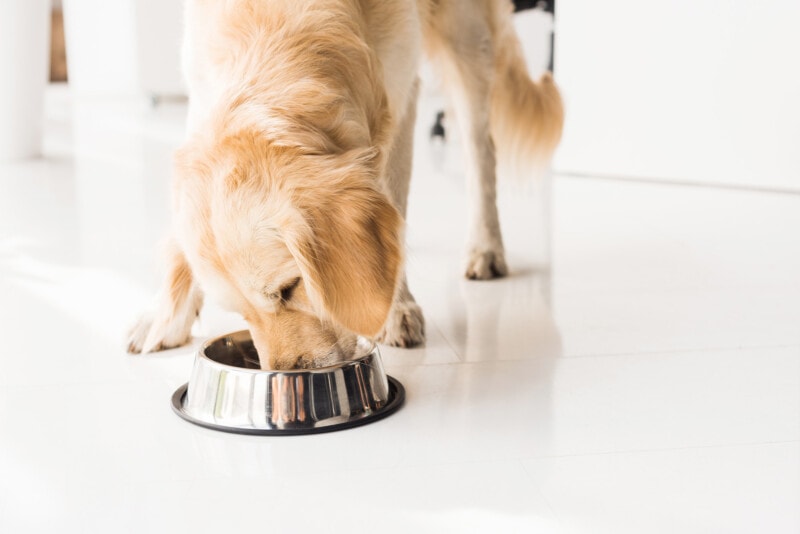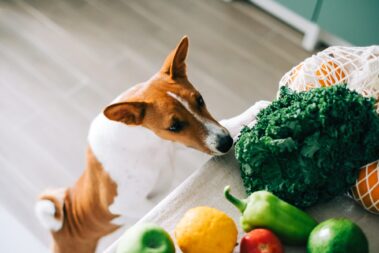As a vegan, you know the value of a diet that centers around sustainable, humane food choices. You also understand that the more people who follow this diet, the better off the planet be. But what about our pets?
Should your dog also be following a plant-based diet and only eat vegan dog food?
In this article, we’ll look at why dogs can’t eat vegan and some steps you can take instead to help feed them more ethically and humanely. We’ll also tell you about the best dog food brands for dog owners who think of the bigger picture.
Table of Contents
Why Can’t Dogs Eat a Vegan Diet?
Dogs aren’t obligate carnivores. This means that they’re able to get or synthesize all the amino acids their bodies need from plant sources.
This is different from cats who literally cannot live without eating meat. Cats are unable to synthesize taurine and arginine in their bodies, two amino acids that are found almost exclusively in animal meat.
Dogs can synthesize their own taurine and arginine from other amino acids, all of which are found, to some degree, in certain plants. For this reason, they’re not considered obligate carnivores. Rather they are mesocarnivores, meaning they get some of their calories from plants.
But that doesn’t mean dogs should ever only eat plants.
Our canine friends descended from wolves. Studies have shown that wild wolves eat a diet that is less than 1% carbohydrates(1). Their bodies are primed for this kind of meat-heavy consumption.
Our dogs still possess many of the same features as their ancestors.
Their guts are short and made to digest food quickly to prevent deadly bacteria build-up. When they eat too much plant-heavy material, digestion slows and the meat they consume begins to go rancid in their bellies.
A meat free diet would solve this problem, but would create another much larger issue. With such short intestines and digestive enzymes made for processing meat, their digestive tracts struggle to pull nutrients from plant material. This means a dog eating only plants can’t get enough nutrients, protein, or fat to sustain themselves.
It’s true that dogs are better equipped to eat plant matter than wolves. But these evolved traits came about out of desperation to survive alongside humans. In order to thrive, dogs need a quality diet that’s made up predominantly of meat and animal fat.
How Can You Feed Your Dog Ethically?
Feeding a dog a vegan diet is not something licensed veterinarian nutritionists or canine dieticians advise. But that doesn’t mean there aren’t steps you can take to help your dog eat more sustainably, ethically, and humanely.
Choose Humanely Raised, Sustainable Meat
As a vegan, the humane treatment of farm animals is likely high on your list of priorities. And it should remain there when shopping for food for your dog.
Free-range, organic meat is considered more humane than meat that comes from animals raised in highly stressful, unclean factory environments like feedlots. You can even find certain types of meat that come with the “Humane Certified” seal, which means the meat was raised and butchered to certain humane standards.
But, unfortunately, humanely raised meat is often at odds with sustainably raised meat. A grass-fed, organic cow, for instance, requires more land, water, and feed to raise than a feedlot cow.
Luckily, there’s one way to find humane and sustainable meat options for your pet. You can opt for meat that is typically not used for human consumption.
Many parts of animals butchered for human consumption are discarded. By opting to feed organic meat made up of this extra product, you can avoid adding to the demand for meat, which lowers your resource footprint and reduces the number of animals slaughtered.
Another choice is to opt for meats that are highly nutrient-dense and calorie-dense. By feeding organ meat, oily fish, and rendered meat meals, you can give your dog everything they need while feeding less meat.
To go this route, you almost need to make your own raw or fresh dog meals at home. But, there are a few commercial options that are more in line with these ideals. More on that in our Best Dog Food Brands section.
Feed Insects
While still very much a living creature and not vegan in any way, insects are a highly sustainable, more humane alternative for providing biologically appropriate protein to your dog.
Insects like grubs and crickets, pound for pound, have more protein than beef. They also require a fraction of the water and resources to farm, making them incredibly sustainable and Earth-friendly.
Many insects also contain high amounts of chitin. This animal product is similar to plant fiber but is better utilized to support healthy digestion and a healthy gut biome in dogs.
Finding dog food made with insects is difficult, but not impossible (see our review of the best dog food brands, below). You can also buy powdered or dried insects online and add them to your dog’s feed in place of meat or to offset how much meat they need to eat.
Replace Some Meat with Appropriate Vegetarian Options
Another option for lowering your dog’s meat footprint is to substitute some of their diet with appropriate vegetarian options. In this case, I’m not talking about plant-based foods, but rather non-meat animal products.
Eggs, yogurt, and some dairy are well tolerated by dogs. And they provide many of the same nutrients as meat.
Cooked eggs are a great way to add protein and fat to your dog’s meals to replace meat. Egg yolks are also packed with vitamins, minerals, and essential fatty acids dogs need. Utilizing eggs from a local farm or your own backyard chickens is a great way to keep things sustainable and humane.
Plain, fermented dairy yogurt is also a good option for dogs. Not only does this food help support digestive health, but it also provides some protein and fat.
Most dogs do not tolerate lactose well, so other dairy products should be avoided. Goat’s milk, however, is one exception. Raw goat’s milk is easily digestible and has a host of benefits for dogs.
Of course, when shopping for yogurt or goat’s milk, look for organic products.
Supplement Nutrient Dense Plant-Based Options
To further reduce your dog’s meat needs without risking their health, you can substitute some meat in their meals with highly digestible plant products.
Soy is generally considered a poor food for dogs to eat. Soybeans contain too much cellulose and fiber for dogs to process. But tofu, which contains little cellulose, is easily digestible in the dog gut.
Tofu is packed with protein and minerals and makes a good supplement for dog diets. But be careful about overdoing it. Too much protein from soy can cause amino acid imbalances in dogs that can lead to serious health effects.
And of course, be sure to opt for non-GMO, organic tofu.
Mushrooms are another great plant-based option for dogs. As a fungus, mushrooms don’t have cellulose, and they’re much higher in protein than plants. They are also a valuable source of adaptogens and phytochemicals known to support health and mood.
Powdered mushroom supplements are easy to find these days. Choose one made specifically for dogs or a human-grade option that contains no sweeteners or added ingredients.
Best Dog Food Brands for Ethical Feeding
The most effective way to feed your dog sustainably and ethically would be to feed them a home-prepared raw or fresh diet. But we understand that most owners don’t have the time to do that.
Below, we look at four of our favorite dog food brands. These diets provide everything your dog needs while offering something a little extra for farm animals and the planet.
Top Choice: NomNom

Features:
- Fresh food without preservatives
- Individualized proportions
- No-hassle subscription service
- Multiple recipe options to choose from
Dry food, while convenient, is not the best option for your dog. The processing and heating the ingredients have to go through to turn into bite-sized kibbles destroy nutrients and enzymes vital to your dog’s health. One way around this is to opt for freshly prepared dog food.
In this category, NomNom is our favorite choice.
This fresh dog food delivery service delivers fresh, real food that is better for your dog while being a more sustainable option than many other choices.
At NomNom, you can choose from multiple base recipes, including:
- Beef Mash (beef, potatoes, and carrots)
- Chicken Cuisine (chicken, sweet potatoes, and squash)
- Pork Potluck (pork, potatoes, and green beans)
- Turkey Fare (turkey, brown rice, and eggs)
Each formula is created by vets to meet all your dog’s nutrition needs as well as their life stage needs. They all include only high-quality ingredients and added nutrients without fillers. These base recipes are tailored to your dog’s needs and preportioned for easy feeding.
Best of all, these meals are delivered right to your door!
The delivery aspect of this food isn’t the most sustainable. But there are other features that are aligned with sustainability. For one, all the meat used comes from US facilities and is largely extra material from meat processed for human consumption.
While this may sound off-putting, many of the parts of the animal that humans don’t eat are actually highly nutritious, especially the organs and sweetmeats.
The recipes also contain an array of highly digestible vegetables, which help add calories and nutrients and replace some of the meat. Plus, all ingredients are gently cooked which preserves vital nutrients so your dog can get more while eating less.
Pros:
- Great for dogs with food allergies
- Fresh and nutrient-rich
- Meat is US-sourced
- Good for large breeds and small breeds
- Appropriate for pups, adult dogs, and senior dogs
Cons:
- Delivery uses more resources
- Not certified humane or organic
- Plastic packaging
Best Humane Certified: Open Farm

Features:
- Animal Welfare Certified
- Multiple animal protein sources
- Wholesome and nutritious plant ingredients
- High protein
Open Farm is a grain-free dog food company that specializes in creating healthy dog food from humanely raised meat. This is one of the only dog food options you’ll find that bares the Anima Welfare Certified seal.
This certification means that all the meat in these diets comes from humanely raised animals. These animals are not confined, have access to the outdoors, are provided enrichment, and are able to perform natural behaviors. They’re also fed only vegetarian feed and are not exposed to antibiotics or synthetic hormones.
Not only is this meat more ethical, but it’s higher quality and better for your pup. The diets also feature a number of healthy, highly digestible plant ingredients, such as apples and dandelion greens. Plus added vitamins and minerals.
All the diets are free from wheat, corn, barley, and other grains. But some do contain lentils and other legumes which can be problematic for dogs susceptible to dilated cardiomyopathy (DCM).
Open Farm has a variety of different flavors and types of food, including kibble, freeze-dried, and wet food toppers.
Pros:
- Can feel better about feeding humane meats
- Well balanced meals
- Plenty of choices
- All grain-free
Cons:
- Meat used is less sustainable
- Some recipes contain legumes
- No canned food options
Best Sustainable: Canidae Sustain

Features:
- Sustainable ingredients
- Earth-friendly packaging
- Well-balanced recipes
- Multiple flavor options
If your biggest concern about meat lies in its impact on the planet, then this dog food is for you.
Canidae has long produced affordable, quality dog foods. And their latest line, Sustain, continues that tradition while including some extra features to make it more environmentally friendly.
All of the meat used in these recipes is responsibly sourced. That means that the farms are audited for their sustainability practices. And the vegetables and grains in the food are grown using regenerative practices which means fewer pesticides and less land used.
The food is also made in the US, reducing carbon admissions for transport. And the packaging is created with 40% post-consumer plastic.
The chicken, chicken meal, and other meat ingredients in these recipes are GAP-certified and raised in natural environments without hormones or antibiotics.
Canidae’s Sustain dry dog food is available in two meaty flavors, chicken and Alaskan salmon. The title food is the first ingredient listed on each diet’s ingredient list.
We especially like the salmon option for its high omega-3 content, ability to support healthy skin, and because it provides extra natural calcium.
Sustain also offers treats, wet food, and specialty diets for small-breed dogs.
Pros:
- Help reduce your pet’s carbon footprint
- Better for the Earth
- Less waste in packaging
- Easy to find an option your dog will like
Cons:
- Lower protein content than others
- High legume content
- Contains grains
- Higher in less digestible plant ingredients
Best Meat-Free: Jiminy’s Dry Dog Food

Features:
- Made from insects
- Contains no meat
- High protein
- Biologically appropriate
When it comes to the best food for the planet, it’s hard to argue against Jiminy’s. This unique line of dog foods is made without meat. But it isn’t vegetarian either.
The protein in each bag comes from insects.
While not completely in line with vegan ideals, using insects is one great way to compromise between what your dog needs and what is ethically and environmentally best.
Insects, like grubs and crickets, are loaded with the same kinds of proteins and amino acids that dogs normally get from meat. This means that they are primed to absorb the nutrition from this kind of food. Insect diets are also naturally hypoallergenic.
Importantly, insects require much fewer resources to grow and sustain. That means they are better for the environment. And while killing bugs is not what vegans advocate, it’s ethically easier to accept than slaughtering mammals and birds.
So if you want the best compromise for your pet food, this is it.
Jiminy’s dry dog food comes in two flavors, Good Grub and Cravin’ Cricket. These all-life-stages diets work as puppy food, adult food, and are great for sensitive seniors.
Pros:
- Ethically better
- More sustainable than meat-based food
- Great for sensitive dogs
- Easily digestible
Cons:
- Pricey
- Limited flavor and recipe options
- Long list of synthetic nutrients
Learn More
Interested in what else you can do to live more ethically and sustainably? Learn more by checking out these great articles:







